Housing Policy
How We Got Here
The creation of this Housing Policy has been a collaborative effort shared by all Nibinamik First Nations community members. The process began when volunteer Housing Committee members and Chief and Council, along with partners at Ryerson University and +city lab, formally committed to reimagining the Housing Policy through a community-driven project in July, 2016. This Housing Policy links community values to how housing is managed. A housing policy designed by, and for the community, ensures that the way in which houses are distributed and cared for is agreed upon and considered fair by all community members.
Since this time, more than one hundred community members of all ages have participated in visioning sessions, workshops, interviews and discussions that would guide the creation of this policy. Community members shared values, knowledge and experience with the project team, and together, common understandings looked to be developed for the maintenance and development of a housing system in Nibinamik. Throughout the sharing process, communication was built on a listen-learn-share model where all participants were recognized as having unique gifts to contribute to conversation, and each was deserving of an opportunity to be heard, and have their knowledge shared.
A first major accomplishment of the project was the establishment of a series of co-created goals for housing in the community which would serve to guide the creation of the Housing Policy.
As well as creating a Housing Policy, this process formalized within Nibinamik a Housing Committee. This Committee will help to guide the implementation of this policy, and the future of housing within the community. The makeup of this Committee, its purpose and functions were designated through a community visioning process.
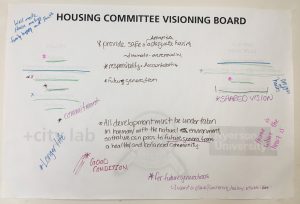
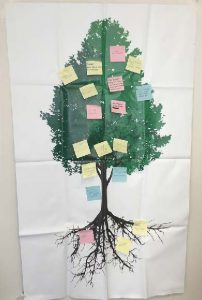
Given the focus on honouring the history of Nibinamik, it was important that all stages of the process included a role for the Elders of the community. They shared both historical understandings of how housing could be managed equitably as well as visions for the future of the community.
Across a number of community workshops and sharing sessions, activities were created that would allow for community members to provide input into each section of the Housing Policy. Activities were created so that all community members, regardless of age or previous experience with housing policies, could have their priorities and preferences be heard. This was in recognition that all community members are affected by housing policy.
The project team were pleased to have so many children and youth, the future leaders of Nibinamik, participate Housing Policy workshops, learning more about the important decisions made within their community, while offering their own perspective.
What follows, in this Policy represents the learnings of this project team over the last twelve months. This Housing Policy has been uniquely created by the members of Nibinamik First Nation, for the community, in order to begin the process of creating safe for future generations.
Section 1: Purpose
1.1 Purpose Statement
The Nibinamik First Nation Housing Policy reflects the values of the community ensuring that everyone is treated fairly and that each family lives in a safe, healthy and appropriate house as soon as possible.
Nibinamik First Nation was established in 1975 when ninety members settled
by Nibinamik Lake.The community started out with 17 log houses that were
built using trees from the surrounding forest. Nibinamik continued to grow,
building houses from local material and relying on the skill and expertise of
community members. In the 1990s, fires swept through the area destroying
parts of the forest, their main source of housing material. It was only at
this point that the community looked for assistance from the government
to help with housing. Today, the community continues to shape its future
through the creation of the Nibinamik First Nation Housing Policy.
This Housing Policy outlines the community’s values, needs and plans for its
future, building on the community’s history and founding spirit.
1.2 Guiding Values & Principles
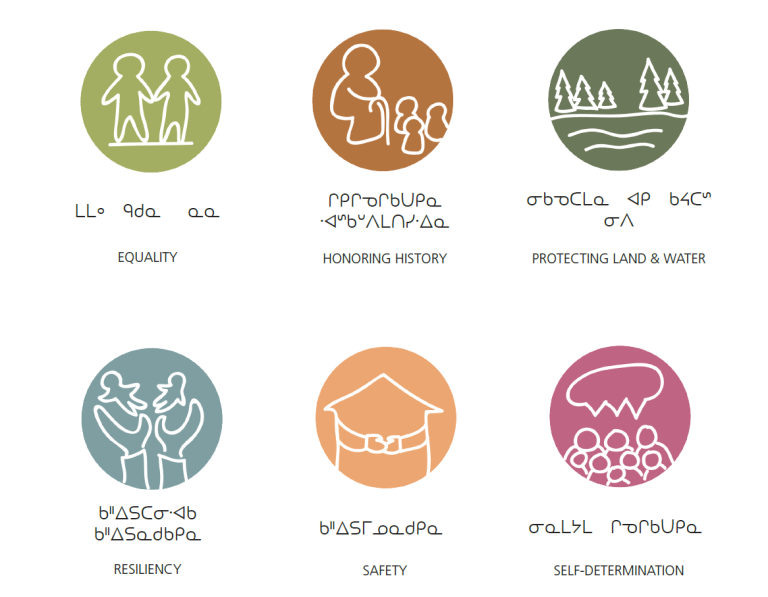
- Ensuring fairness in housing
- Improving quality of housing to improve quality of life
- Promoting good health in community members
- Protecting what makes Nibinamik unique
Section 2: Housing Committee
2.1 Housing Committee Purpose Statement
Working together to create safe and fair housing solutions while honoring our history and protecting the environment to pass on to future generations.
2.2 Roles and Responsibilities of Housing Committee Members
The Housing Committee will be responsible for maintaining regular communication with community members about housing program decisions, funds, initiatives and policy changes.
It is the Housing Committee’s responsibility to develop, maintain and present to Council annual and long-term housing plans. Housing plans are developed from the available budget, provided by the Band Manager and must include, but are not limited to:
- Costs associated with new housing construction;
- Costs of renovations to existing houses;
- Costs for repairs and regular maintenance;
- Personnel and training expenses;
- Potential revenue streams; and
- Recovery of previous budget, over expenditures.
The Housing Committee is also responsible for conducting the five year review of the Housing Policy.
Any budgeting decisions whose total impact is estimated to be greater than $5,000 must be approved by the Chief and Council or an officer to whom they have delegated this authority.
The Housing Committee, with the support of Band management and technical staff will be responsible for maintaining housing records, documentation of communication and other housing program information. The Housing Committee will maintain records within a database with a minimum of the following information:
- Condition of housing assets;
- Purchase service contracts and associated documents;
- Available infrastructure and total usage;
- Inspections and their results; and
- Required renovations, repairs and maintenance.
The Housing Committee is responsible for the day-to-day operations of the housing program. The Housing Committee can, if requested by Chief and Council, supervise contractors and subcontractors hired by the First Nation in relation to housing services and as delegated will be responsible for day-to-day operations of the housing program.
The Chief or Band Manager can delegate further actions or responsibility under the housing program
to the Housing Committee when needed.
2.3 Who is on the Committee?
Volunteer members of the Housing Committee will be appointed by the Chief and Council. The appointment of the first Housing Committee under these policies should be made as soon as possible. Membership should include youth and Elder representatives, when volunteers exist.
Up to seven (7) members can be appointed to the Committee and it should have no less than three (3). One position will be for the Council member holding the relevant portfolio. Members will not receive honoraria for their services but they will be reimbursed for any expenses which they may incur in their official duties and functions.
If there are not enough Housing Committee members, and the Housing Committee is unable to perform the responsibilities listed above, then the Chief and Council can, on an interim basis assume those responsibilities until new Committee members are named.
2.4 Housing Committee Member Terms
Each Committee member, once appointed, will serve a two (2) year term. Members can be reappointed after the completion of their term. Members are required to complete a Code of Ethics workshop before assuming responsibilities.
Members will be removed from their appointment if:
- They are found by Chief and Council to have acted unfairly or demonstrated bias;
- Three (3) consecutive meetings are missed without proper notification of the Council member
holding the housing portfolio; - Behaviour outside the Committee is deemed by Chief and Council to make them unfit to
serve.
2.5 Meetings
The Housing Committee shall meet, at minimum once a month.
Quorum of the Housing Committee is reached when at minimum half of all appointed members are present.
Quorum must be reached at any meeting in which voting for recommendations or motions takes place.
Passing a recommendation or motion requires a vote in support by a majority of present members. In the result of a tied vote, the councillor with the housing portfolio casts the deciding vote.
Minutes of meetings, and record of votes taken should be recorded and made available to community members within one (1) week of each meeting. Records should be available both at the Band office, and digitally as well as being summarized for a radio announcement.
2.6 Conflict of Interest
Housing Committee members will not make any decisions, or be part of discussion of decisions which involve their own house or application for housing or those of their immediate family members (parents, children or siblings). Members must declare a conflict of interest at the start of a discussion and cannot vote on the matter.
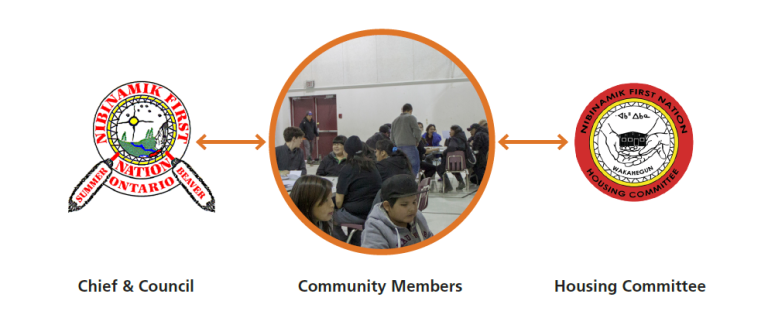
Section 3: Current Occupants
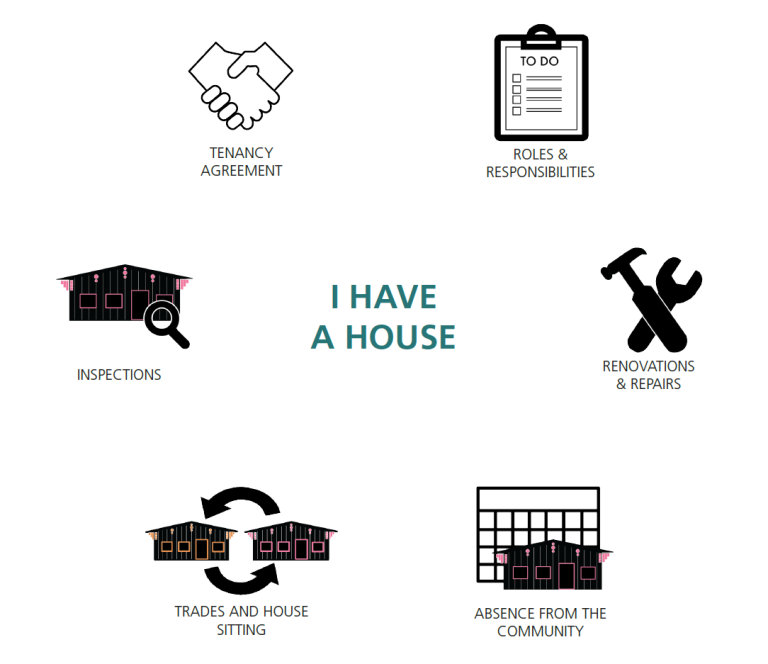
The Current Occupants section lays out the roles and responsibilities of the Band, community members and those that are shared with regards to existing housing.
This section explains:
- What the Band will do and what community members will do to keep houses in good repair;
- How to get housing repaired or renovated when needed;
- What to do if you are leaving the community temporarily or permanently;
- What to do if you need a house sitter or want to trade your house; and
- How inspections will happen.
These are all summarized in the Housing Agreement which is signed by each household.
Housing Agreements help to create fairness, transparency and accountability for all community members.
3.1 Housing Agreement
Can a Housing Agreement end?
Yes
If Chief and Council find a community member is dangerous to other people or may destroy a house, the Chief and Council have the right to evict the member.Can a Housing Agreement change?
Yes
Under special circumstances relating to the health, safety or the well-being of occupants, the Chief and Council maintain the right to add or remove household members from Housing Agreements, all occupants must be notified of any changes.
The Housing Agreement outlines the responsibilities and obligations of the Housing Committee and community members. An agreement ensures accountability and fairness.
The Housing Agreement explains what will happen in different situations such as community members leaving their houses, inspections, repairs and house trades. It also explains what the occupant needs to do and what the Housing Committee needs to do.
A Housing Agreement must be signed in order to live in a house in the community. Required information includes:
- The names and birthdates of all individuals who will be
permanent occupants of the house; - The roles and responsibilities of the Band and occupant in
maintenance, repairs and renovations; - The important steps community members must take when
applying for any changes in their housing situation; - The signature of the head(s) of household agreeing to all
conditions of the Housing Agreement and Housing Policy.
- The names and birthdates of all individuals who will be
The Housing Agreement outlines the roles and responsibilities of the Band and occupant. By signing an agreement occupants and the Band are committing to each other to follow through on their responsibilities. The Agreement represents the partnership between the Band and community members and a commitment to maintain and improve housing together.
In the event of a relationship breakdown between primary occupants, the occupant who retains custody of involved children will retain occupancy of the house. Where no children are involved, occupancy will be determined as part of an appeals process administered by Chief and Council.
In the event of the death of the primary occupant, the new primary occupant will be:
a) The co-applicant; if none listed then,
b) The first current occupant listed on the Housing Agreement over 18 years of age; if none listed then,
c) The next household on the Priority Needs Waitlist.
Housing Maintenance Fees
The Housing Policy and Housing Agreement may be amended in the future to include a housing maintenance fee. Housing maintenance fees would be allocated to the repairs and renovations budget in order to meet the increasing costs of housing maintenance. The community must be informed before any changes or additions of fees by the Chief and Council through a community meeting and adoption of a Band Council Resolution.
3.2 Roles & Responsibilities
This table details the occupants responsibilities and shared responsibilities between the Band and community members. It is the responsibility of occupants to report any repairs or renovations by the process detailed in the following section. All occupant repairs or renovations must be performed in such a way that returns the home to its original standard.
Occupants are responsible for the regular maintenance of their house. Repair or replacement of defective materials, or damage caused by improper installation by the Band will be repaired by the Band. Any damaged caused by the occupant(s) due to neglect or willful harm will be the responsibility of the occupant to repair. Note also that any repairs with a total cost less than one hundred dollars ($100) as assessed through the inspection process will be the obligation of the occupant.
Where responsibilities are listed as shared, this is to help the relieve financial burden on the Band. Occupants can share cost either by purchasing materials or completing the labour. When occupants cannot assume shared responsibility the Band will, but on a lower priority timeline.
ROLES & RESPONSIBILITIES TABLE
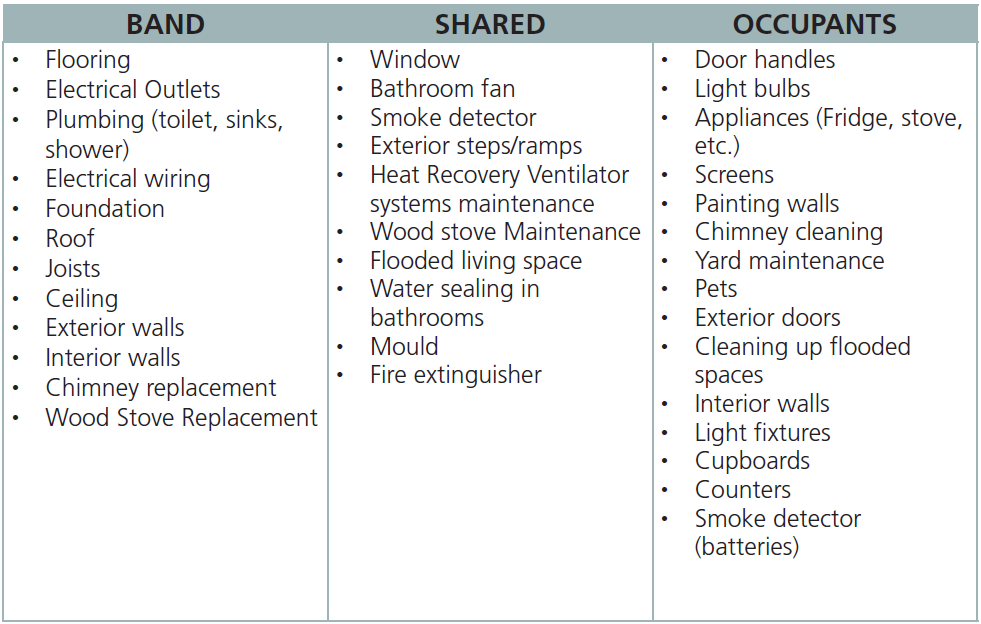
In the event a task is not on this list the Housing Committee will compare it to other similar tasks to determine if it is a Band, individual or shared responsibility.
3.3 Renovations & Repairs
Occupants who can contribute financially to renovations, or provide labour contributions will receive priority in the assessment of their requests in order to reduce the financial burden on the Band. They must still follow the steps while noting on their application what their contribution will be. All parts and labour must be at the same standard that the Band would provide.
Major housing renovation projects occur in the spring and summer. Renovation and Repair Form applications must be submitted by mid October so the Housing Committee can plan for the renovation and repair season.
Deadline dates will be determined at the beginning of each fiscal year and the community will be informed of the dates at community meetings and by a newsletter from the Housing Committee.
Only Renovation and Repair Forms submitted to the Band Office by October 15th will be considered for renovation projects by the Housing Committee.
EMERGENCY?
Contact the Chief and Council AS SOON AS POSSIBLE if there is an emergency in order to find a permanent or temporary solution.
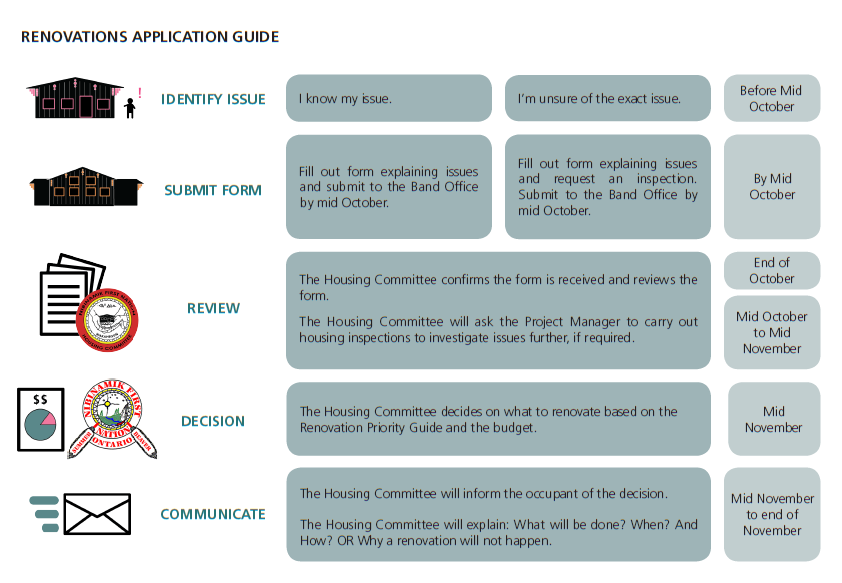
Occupants who can contribute financially to repairs, or provide labour contributions will receive priority in the assessment of their requests in order to reduce the financial burden on the Band. They must still follow the application guide while noting on their application what their contribution will be. All parts and labour must be at the same standard that the Band would provide and at minimum, comply with relevant building codes.
Application for repairs may occur throughout the year and follow the same steps as renovations. Renovation and Repair Form applications will be decided based on who is responsible for an item or task, as outlined in the Roles and Responsibilities table, as well as the availability of funds.
Only Renovation and Repair Forms submitted to the Band Office will be considered by the Housing Committee.
Housing Maintenance
Occupants are responsible for the regular maintenance of their houses. An annual housing inspection will check to ensure occupants are maintaining their homes and to track housing issues. Occupants who are found to not be maintaining their house may be required to assume the associated costs of repairs and renovations. The Housing Committee, with the approval of Chief and Council, can create a maintenance checklist which would act as an additional responsibility of occupants to those in the Housing Agreement.
If an occupant does not hear back from the Housing Committee in the expected timelines, they are encouraged to reach out to the Housing Committee to check the status of their application or to Chief and Council.
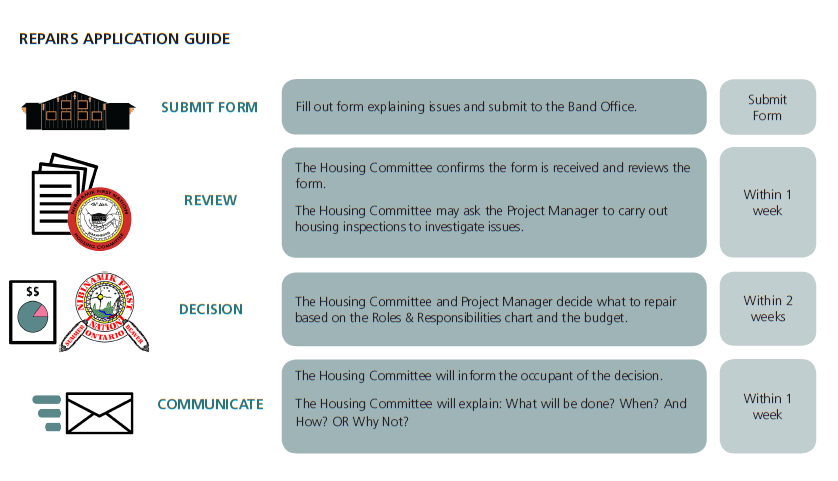
3.4 Absence from the Community
There may be times when community members leave Nibinamik for work, health, school or other personal reason leaving a house vacant. When an occupant is away within an acceptable timeframe, a house may go to a house sitter. When an occupant is away longer than is outlined below, their house will be reassigned to a new family based on the Priority Needs Waitlist (see Section 4). Chief and Council will review cases before a house is reassigned.
Occupants must inform the Housing Committee anytime they will be away for periods of longer than two (2) weeks by submitting an Absence from the Community Form.
- Talk to the Housing Committee at least 1 week before you are planning to leave the community and fill out the Absence from the Community Form to explain Why? When? and How long? you will be leaving.
- The Housing Committee reviews the form following the Absence Guidelines. Special cases will go to Chief and Council with a recommendation from the Housing Committee; and
- The Housing Committee will respond, within two (2) weeks, if a house can stay vacant, should have a house sitter, will be reassigned or if the matter needs to be referred to Chief and Council.
Find forms in the Band Office.
Absence Guidelines
An occupant can be away from the community for a different number of months based on their reason for leaving before a house is reassigned to the highest priority family.
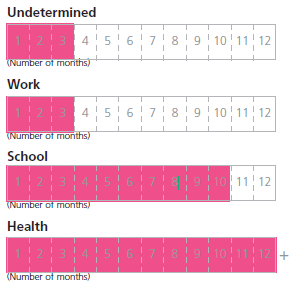
Special Circumstances
Flexibility is needed when community members leave under special circumstances. The Housing Committee will make a recommendation to Chief and Council to review and decide on special cases.
3.5 House Sitting & Trades
House Sitting
House sitting is a short-term agreement to live in and maintain a house between community members instead of leaving the house vacant when occupants will be gone within the accepted Absence Guidelines.
The Housing Committee must review house sitting arrangements to ensure Absence Guidelines are followed. A House Sitting Agreement will be signed between occupants and house sitters. Note that Chief and Council have the ability to reject a potential house sitter for having previously violated a Housing Agreement, or in the case that they do not believe an individual could fulfill the responsibilities of a Housing Agreement.
- Talk to the Housing Committee if you are planning to be away for at least 2 weeks and fill out the Absence from the Community Form;
- Following the Absence Guidelines, the Housing Committee will recommend either confirmation or rejection of the proposed house sitter- pending approval of Chief and Council; and
- The Housing Committee will have the occupant and house sitter sign a House Sitting Agreement.
House Trades
Community members may trade houses. Houses can be traded with other occupants for a variety of reasons.
House trades may change a person’s housing need and change the priority waitlist for housing. The Housing Committee must be told before a trade can happen.
- Talk to the Housing Committee and let them know you and another household have agreed to a trade. Fill out the House Trades Form saying Who is switching? Are housing occupants
changing? When would you like the trade to happen? - The Housing Committee will review the form and set an inspection date within two (2) weeks; and
- Occupants will sign a new Housing Agreement after the completion of the trade.
- Talk to the Housing Committee and let them know you and another household have agreed to a trade. Fill out the House Trades Form saying Who is switching? Are housing occupants
3.6 Inspections
Inspections are an important part of housing maintenance. Inspections can help to determine what kind of renovations or repairs need to be done. The Housing Committee must provide occupants with advance notice of three (3) days for any inspections. Occupants must comply with all inspection requests.
- The Housing Committee will inform the occupant with a Notice of Inspection Form three (3) days before an inspection;
- The Housing Committee will confirm the date and if an occupant will need to be home; and
- The Housing Committee will carry out the inspection.
Annual Housing Inspections
Annual housing inspections will be held every spring. Annual housing inspections are an important part of housing maintenance, tracking problems and planning for future needs.
Records of inspections will be maintained by the Housing Committee.
The annual housing inspection check will include, but not limited to:
- Roof
- Foundation
- Windows
- Flooding
- Mould
- Smoke Detector
- Fire extinguisher
- Chimney
When is an inspection needed?
• Move in/Move out or House Trade
• A renovation or repair has been requested
• Annual housing check ups
Section 4: Applicants
The Housing Applicants section outlines how housing is allocated in the community. The limited funding received for new housing requires that decision making guidelines, based on need, be created to fairly distribute new houses.
This section explains:
- How to apply for new housing; and
- How houses are distributed based on the Priority Needs Waitlist.
This section will ensure fairness and transparency in decision making.
4.1 Applying for Housing
Applications for housing will be accepted and processed by the Housing Committee anonymously to ensure fairness and to avoid bias and conflicts of interest. Chief and Council will have final decision making authority and will review and decide on the Housing Committee’s recommendations for the allocation of new housing.
The Housing Application Form must be submitted by mid October so the Housing Committee can plan for the year ahead.
Deadline dates will be determined at the beginning of each fiscal year and the community will be informed of the dates at community meetings and by a newsletter from the Housing Committee.
Any community member 18 years of age or over can apply for housing.
Applicants must understand and agree to the terms of the Housing Agreement before their application will be considered.
Housing applications must be updated each year to ensure the accuracy of Priority Needs Waitlist. Applicants will be responsible of informing the Housing Committee if their living situation or housing needs change, this applies at all times once any application has been submitted. If, after allocating new housing, Chief and Council or the Housing Committee find that occupants do not match their application, they may reevaluate the allocation of housing.
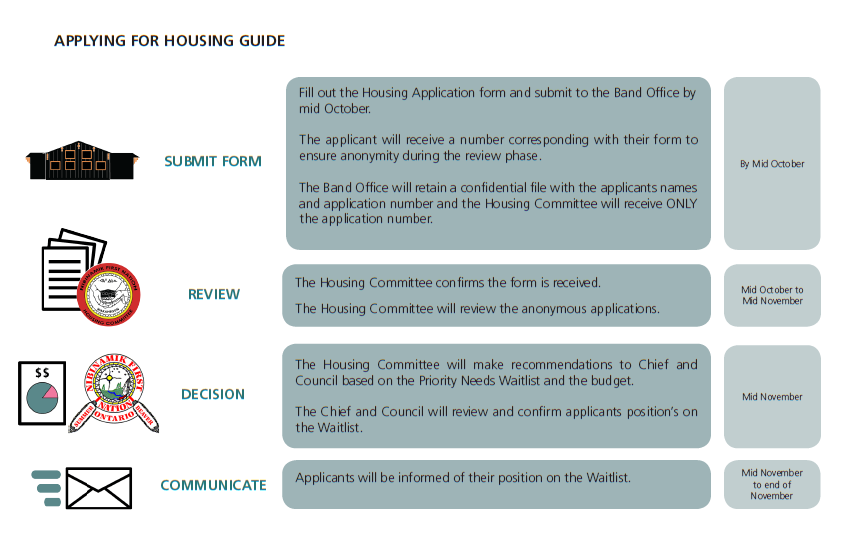
4.2 Priority Needs Waitlist
The Housing Policy recognizes that all community member’s housing needs are important. When deciding on who gets a new house, a priority list reflecting what the community recognizes as the most urgent issues has been made.
The Housing Committee will make decisions on new housing allocation using the Priority Needs Waitlist Guide.
The Housing Committee will be responsible for maintaining the Waitlist.
In prioritizing needs, issues are separated between personal needs and the current condition of an occupant’s house. Personal needs and housing conditions are separated to better understand each occupant’s circumstances. This provides an opportunity to identify the most urgent issues and also to propose solutions addressing the most urgent needs. Through this process the Waitlist Guide will help to address health and wellness issues through housing.
The below is a guide of how priority will be determined in the application process. Specific needs-based questions can be found on the Housing Application Form.
EMERGENCY?
In situations where the health or safety of an occupant or occupants are threatened, Chief and Council will review the situation and work to find a temporary or permanent solution to ensure the wellbeing of the occupant or occupants.
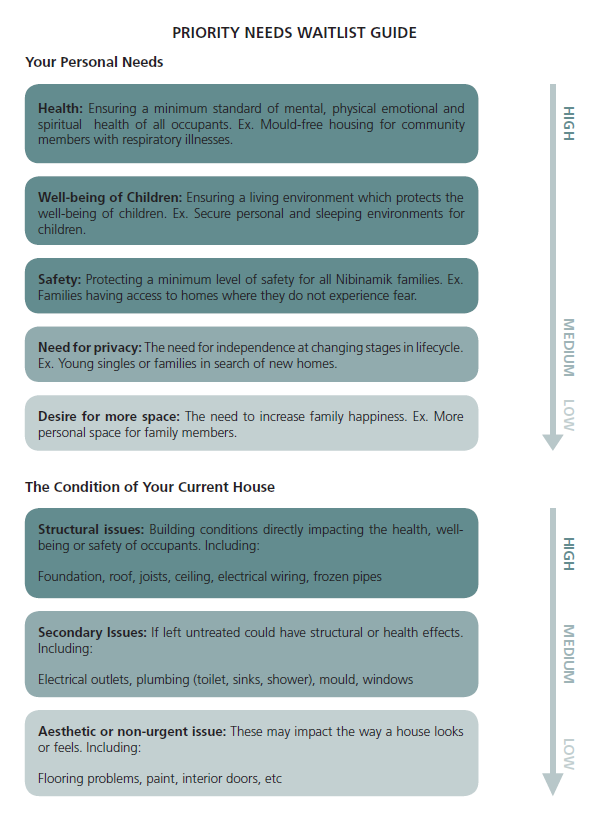
Section 5: Administration
5.1 Decision making
Decisions and recommendations made by the Housing Committee will follow the voting structure outlined in Section 2.
When a recommendation is made to Chief and Council it will be done in writing by the the Housing Committee and should be presented by the Councillor with the Housing Portfolio. If they are unavailable another member of the Committee can present the recommendations.
All decision making authority continues to rest with Chief and Council unless otherwise delegated by this Policy or by future amendments which would require a Band Council Resolution.
5.2 Appeals
Any community member who disagrees with any decisions relating to their Any community member who disagrees with any decisions relating to their housing situation or an application made under this Housing Policy has the right to appeal the decision within 30 days.
Community members will submit an oral or written notice of appeal to both the Housing Committee and a member of Council. The appeal must be acknowledge the appeal within fourteen (14) days and within that time set a date to hear the formal appeal.
A record of appeals and decisions will be maintained by the Housing Committee.
5.3 Amendments
The Housing Committee or any community member may suggest changes to this Policy following its adoption. Proposed changes must be sent in writing or made in person to the Housing Committee and a record of proposals maintained.
The Housing Committee will consider amendments and make recommendations to Chief and Council for the final decision.
Amendments can be made by Chief and Council by Band Council Resolution. Amendments will be listed in order of date the amendment is passed and added to the end of the current Policy.
Community members must be notified within 30 days of any amendments.
5.4 Communication
The Housing Committee will keep all community members informed of its work through:
- A quarterly newsletter: available at the Band Office and online;
- Monthly radio announcement including: summary of previous Housing Committee meeting, upcoming activities, recent recommendations and other news. Made in both languages;
- Social media posts; and
- A semi-annual housing open house open to all community members.
5.5 Funding
Chief and Council will be responsible for all aspects of program funding and financing.
5.6 Procurement
In line with the values of equality, self-determination and resilience the procurement process should ensure that Nibinamik housing is being built to the highest possible standard and that tendering processes are fair and open. Where possible sustainable innovations should be sought, protecting the land and water and creating resilient housing while not erasing the history and uniqueness of Nibinamik.
As part of the tendering process, applications which include hiring local workers, use of local materials and skill-based training of locals will, where possible, be given preference.
5.7 Design Guidelines
Community specific design guidelines can be created and added to this Housing Policy through the amendment process. These design guidelines must respond to the values listed above.
5.8 Insurance
The Band will be responsible for any and all insurance obligations.
